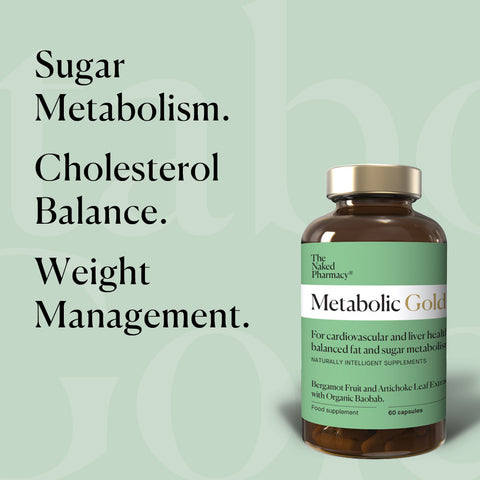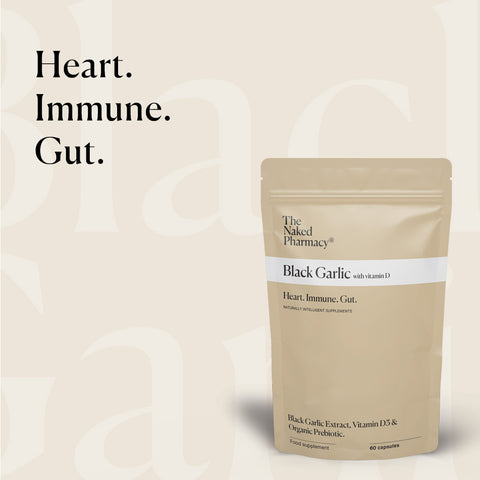Journal
How to lose weight naturally
Accumulation of belly fat is something that can creep up over the years and catch us by surprise. It is suggested that on average adults gain ~1.5kg annually and never shed that weight. Why is that?
The answer is often our lifestyle. Reducing calorie intake and supporting gut health by increasing your vegetable intake will support weight loss but shifting belly fat can be more troublesome. Coupled with this is the effect this fat is having internally - on our blood vessels and heart for example.
One of the biggest culprits driving stubborn belly fat is sugar intake
Hidden sugars in many foods and drinks will increase the accumulation of fat in the tissues and blood vessels. Look at the sugar contents of many cereals, breads, fizzy drinks etc and try to cut them out completely. Every improvement you make by increasing exercise or supplementing can be completely counteracted by your sugary intakes.
Metabolic Gold
One clinically tested solution for bad fats is Metabolic Gold, a natural food supplement made from Italian bergamot fruits. Studies have shown that 2 capsules daily with food for a period of 4 months can help manage weight and cholesterol alongside a healthy eating and exercise routine. How does it do this? Each tablet is packed full of active ‘power house’ polyphenols at 35% effective strength. These polyphenols bind to bad fats from our diets in our gut and tissues. They also help to balance cholesterol in the liver. Double whammy!
Black Garlic
When it comes to protecting our heart we can further help by supplementing our diet with daily Aged Black Garlic. This has been shown to help relax our blood vessels, allowing for more efficient circulation of blood to our tissues. How does it do this?...Our Black Garlic is selected due to its naturally high concentrations of the chemical allicin. A six month aging and fermentation process converts allicin to active S-allyl cysteine (S-AC). This high strength, premium grade S-AC provides the protection for our cardiovascular system. Aged Black Garlic and Metabolic Gold are a perfect combination, working in harmony with each other on separate cardiovascular systems.
Vitamins: Natural or synthetic?
Research supports the use of targeted nutritional supplements for a wide range of health benefits.
We always recommend that you meet your daily requirements primarily from the diet. However, due to reduced nutritional content of intensively farmed foods, it can be difficult to achieve this.
The need for evidence:
Every person is unique. However, the National Sleep Foundation guidelines advise that healthy adults should sleep, on average, between seven and nine hours a night.
There must always be an evidence-based reason for supplementing your diet or a specific nutritional deficiency that needs resolving. For instance, folic acid in pregnancy, magnesium for muscle cramps/sports recovery, vitamin C and vitamin D for strengthening the immune system.
What's the difference between natural & synthetic vitamins?
Not all supplements are the same in terms of the way they are sourced, manufactured, tested and packaged. For vitamins and minerals, consumers should always be asking suppliers where the ingredients are sourced from and how they are manufactured
How are synthetic vitamins made?
Synthetic vitamins are usually made artificially from chemicals within a laboratory or factory. They mimic the chemical structure of naturally occurring nutrients. The more complex the structure of the vitamin/mineral the more stages required to synthesise and therefore the greater number of impurities that need to be removed before the final product can be sold as a food supplement. Petrochemical solvents may be required to achieve this, which can have a negative impact on the environment.
How are natural vitamins made?
Natural vitamins are sourced from whole food such as algae, fruit or vegetables. They are dried, concentrated and their nutrients are extracted (generally with water or alcohol) to form a nutritional supplement. In this way, the beneficial compounds remain in their natural form, just as you would find them in your food but at much higher concentrations. Studies have shown that naturally sourced minerals have a higher bioavailability than synthetic alternatives because they are absorbed more efficiently.
What’s the difference between natural and synthetic vitamin C?
Vitamin C (ascorbic acid), an essential water-soluble micronutrient, is a good example of the differences between synthetic and naturally sourced. Whilst synthetic and food-derived vitamin C are chemically identical, the food-sourced version is rich in numerous additional nutrients, dietary fibres and phytochemicals which contribute to the health of the gut micro-biome. These synergistic ingredients are not present in chemically produced vitamins.
Final Thoughts:
A research-based approach for supplementation using only food-sourced vitamins and minerals provides advantages for both the health of the body and the environment. When supplements are made only from concentrated, 100% natural ingredients they are better absorbed and able to support the gut micro-biome. The Naked Pharmacy includes organic prebiotics within all its vitamin and mineral formulations.
Kevin Leivers M.R.Pharm.S.
Vitamin B12 and why it's important our products remain food sourced.
Last year we made the important decision to change the vitamins and minerals in our supplements to food sourced which means we no longer use synthetic ingredients. Six weeks ago our supplier of Vitamin B12 in India had to close due to COVID, at present; this is the only manufacturing plant in the world that makes Vitamin B12 extracted from mushrooms to the standard we require.
As a result of this shutdown, we decided to remove Vitamin B12 from our Saffrosun supplements and replace it with Organic Marine Algae which provides a wide range of essential minerals and is sourced in waters off the Scottish coastline. It's important to us that our community understands why we took this step and why it is essential for us to maintain this principle whatever the challenges that arise. So here are a few of the reasons why we changed to food sourced ingredients:
Safety:
Synthetic vitamins and minerals are often produced by chemical factories where the quality assurance procedures may not always meet our high standards. We feel that only full on-site quality audits can assure us that the ingredients are made correctly without chemical by-products (formed during the chemical processes) that could be harmful.
Effectiveness:
This has to be assessed on a case by case basis, as some synthetics are effective whilst others are not. Synthetic Vitamin E is a good example as the synthetic process produces different forms of the same vitamin which are significantly less effective than the natural D-Alpha form. We concluded that food source vitamins help eliminate this potential issue.
Environment:
Synthetic products use potentially harmful raw materials which create additional by-products, the more complex the synthesis process, the more of these by-products need to be removed from the final product. This leads to more environmental waste and increases the carbon footprint.
Pharmacists Advice:
When our Vitamin B12 supply was interrupted, rather than revert to adding a readily available synthetic B12, we sourced organic marine minerals from the Scottish Hebrides as a replacement instead. Based on science and our core values, we believe it will bring additional benefits, especially in terms of energy levels. Our Saffrosun Energy can be taken alongside prescription medicines (just like the previous formula) and also with an underactive thyroid, although additional iodine supplements should be stopped. We do not recommend taking Saffrosun with Marine Minerals if you have overactive thyroid function. We aim to have our Saffrosun Calm back in stock late November 2020 at the earliest.
Italian bergamot: The Mediterranean way to a healthy cardiovascular system
As if Chianti and pizza were not enough reasons to love everything Italian, one of the most powerful natural solutions for cardiovascular health has Italian roots, literally!
Bergamot may sound familiar as the peel of this citrus is often used for teas, perfumes and essential oils. The fruits grow on trees only in the region of Southern Italy called Calabria, very close to Sicily.
Beyond the appeal of the peel, the fruit pulp itself has a unique combination of five polyphenol bioactives, whose names are a mouthful such as naringin, bruteridin and melitidin. These natural bergamot compounds block the same enzyme as statin medications but without the side effects. Bergamot fruit extract has also been shown to lower blood sugar, reduce inflammation, improve blood vessel activity and activate the AMP-K system, similar to a common diabetic drug called metformin.
How is all of this known about the citrus fruit growing in a remote area of Italy?
There was a belief that natives of Sicily who ate the fruit of the bergamot citrus tree did not get heart disease, diabetes and other maladies.
Universities in Italy began studying this folklore which proved to be accurate, based on a number of high quality human clinical studies. There are now more than 200 scientific studies exploring the role of bergamot for health. Bergamot is now available in capsules that concentrate the active polyphenols found in the whole fruit.
Does bergamot actually work?
The science says yes and the experiences and feedback from consumers who regularly take bergamot supplements supports this too. In a recent trial of 77 patients with high cholesterol, subjects were treated with either a statin medication alone or a combination of statin and bergamot. The combination therapy produced the lowest LDL cholesterol and the highest HDL cholesterol.
This trial also showed the measures of damage to blood vessels by oxidation were the lowest when bergamot was added. Further studies have demonstrated the beneficial effects of bergamot on blood sugar levels and body weight were demonstrated.
What about metabolic syndrome?
Metabolic syndrome is a combination of increased abdominal fat and waistline, hypertension, abnormal cholesterol lipid values with low HDL and high triglycerides and elevated blood sugar.
An estimated 20–25% of the world’s adult population is thought to have this condition and maybe as many as one third of adults in the United Kingdom suffer from it. Bergamot has proven to be particularly useful in assisting the reversal of this syndrome, which raises the risk of future events like heart attack and stroke.
A particularly challenging condition seen more and more commonly is non-alcoholic fatty liver disease (NAFLD), also known as NASH. NASH results from an inactive lifestyle along with a diet that is high in processed foods, oils and fats which over time, overloads liver cells with fat droplets. It is also associated with insulin resistance, pre-diabetes and adult Type 2 diabetes as the insulin resistance builds. While the foundation of the treatment of NASH is activity, weight loss, plant-based diets with low or absent of added oils, bergamot shows promise here too. In a study of humans with metabolic syndrome and NAFLD, significant responses to bergamot were recorded.
What can Metabolic Gold do for you?
When combined with lifestyle efforts focusing on diet, exercise, sleep and stress, the bergamot fruit from southern Italy could provide significant cardiovascular benefits.
Our new formulation of Metabolic Gold sees a move from tablets to capsules that contain pure Bergamot fruit extract and artichoke leaf extract in a tapioca capsule shell, nothing else.
Immune strength diet- The 3 P's
We recommend focusing your daily diet and supplements on the 3P's - Polyphenols, Prebiotics and Probiotics.
- Polyphenols - natural chemical bioactives from edible plants. At the correct strength, they are effective for a wide range of health problems.
- Prebiotics - inedible plant fibres that specifically feed healthy gut bacteria.
- Probiotics - healthy gut bacteria. We play host to trillions of bacteria and yeasts, many of which live in our gut. Some examples of species are lactobacillus, bifidobacteria and saccharomyces.
This week we're talking about two polyphenols in particular, S-allyl cysteine (SAC) and Elenolic Acid (ELA), which are derived from Black Garlic and Olive Leaf.
A daily intake of Black Garlic and Olive Leaf is a popular recipe of sorts, but not for the kitchen! In fact, it is one for optimum immune health whether taken short or long term, to support our natural defences and much more.
Garlic - Black or White?
Black garlic is white garlic that has been aged and fermented for a period of up to 6 months under controlled temperatures and humidity. The physiological changes to garlic as a result of this process are the reasons for its enhanced bioactivity.
So, what happens:
The most obvious change is that it turns from white to black and loses its potent odour. Fermentation reduces the sulphur content of white garlic, which eliminates that tell-tale garlic odour. Its taste is also changed from pungent to sweet with a new sticky, chewy texture. Allicin, the main biochemical in a white garlic bulb, is converted to the polyphenol S-allyl cysteine (SAC). This increases the potency of this phytochemical by up to 10-fold. It is this plant powerhouse that really provides the many health benefits.
Did you know that Black Garlic can:
- Reduce oxidative stress on the heart.
- Help to maintain a healthy blood pressure.
- Improve gut health.
- Contribute to improved immune health.
Black Garlic supplement from The Naked Pharmacy is:
- Free from synthetics with a tapioca capsule shell.
- Batch tested for the effective strength of SAC.
- Fortified with an organic prebiotic, Moringa, for additional gut support.
- Odourless and safe.
We recommend a daily dose of ONE capsule, with or after food for this all-round, hardworking supplement.
Elenolic Acid (ELA) from Olive Leaf.
Olive leaves have been used in medicine dating back to Ancient Egypt, where they were considered a divine symbol as well as a popular remedy for fever.
Recent reports have shown that ELA acts to effectively put the brakes on a viral life cycle. It has been shown to be a natural neuraminidase inhibitor, recommended by WHO for viral infection management. We know that neuraminidase is an enzyme present in the flu virus that facilitates entry of the virus into a healthy host cell. ELA prevents this.
Olive Leaf from The Naked Pharmacy is:
- 100% plant based. The Olive leaves are carefully harvested in Spain and an innovative process is used to isolate the ELA extract to create the most effective supplement.
- Fortified with the natural prebiotic, Moringa Leaf, for a prebiotic to support your microbiome and gut health.
- Side effect free and safe to take alongside prescribed medicines such as antibiotics.
Easy to remember dose of ONE capsule daily, with or after food.
Vitamin D and COVID-19
Recent articles in the press discuss the potential of Vitamin D supplementation to reduce the risks of Covid-19.
This article will provide key research information on the benefits of Vitamin D for the immune system plus pharmacist advice on which indication has sufficient clinical research to support its use.
What is Vitamin D?
Vitamin D is called the sunshine vitamin because it is produced naturally by the action of sunlight on the skin.
NHS England recommends a daily supplementation of 10 mcg (micrograms) from oily fish such as salmon and sardines or vegetarian/vegan friendly sources. The latter are either synthetic (man-made vitamin D3) or from mushrooms (vitamin D2). One natural vitamin D3 version exists which is derived from marine algae. Vitamin D3 is better absorbed by the body compared to vitamin D2.
Why is Vitamin D important?
A study, published in the BMJ in 2017 which reviewed data from 25 trials, showed the vitamin can help prevent acute respiratory infections, particularly in those patients with a pre-existing vitamin D deficiency.
Professor Martineau, who was the lead author of the review, stated ‘When vitamin D is made in the skin, it gets converted in the liver to a form that circulates around the body. This creates a natural antibiotic-like substance in the lining of the airway that can bash viruses and bacteria, killing them’.
‘It is a generic effect: we don’t know yet whether that would work against Covid-19.’
Research from the University of Birmingham carried out in 2018 demonstrated that vitamin D deficiency trebles the length of hospital stay.
Can Vitamin D be used to treat Covid-19?
Previous studies and data reviews have shown that Vitamin D can help prevent and treat respiratory infections such as community acquired pneumonia.
However, despite the recently quoted Irish study suggesting that high dose vitamin D could be used as part of the Covid-19 treatment program there is still insufficient evidence for its role in reducing the risk of the coronavirus.
Who is susceptible to Vitamin D deficiency?
It is thought that around 1 in 5 adults and children in the UK are deficient in Vitamin D. The recent coronavirus lockdown, on top of (sensible) use of sunscreens may have contributed to decreased levels of vitamin D in the blood.
Research has shown that levels of deficiency are higher than expected in the general population. Research from The University of Surrey discovered a high number of students had very low levels vitamin D at the end of the summer term when levels were expected to peak.
What can I do to increase my levels?
Daily exercise outdoors will help boost levels.
10 minutes exposure for pale skin on the arms and face, darker skin may need around 25 minutes exposure to stimulate Vitamin D production.
Ethnic groups with dark skin need more daily sunlight exposure and should also take a year-round supplement.
Which are the effective Vitamin D supplements?
Vitamin D supplements are widely available.
The most easily absorbed version is called D3 but these supplements are commonly made from synthetic or animal sources.
One vegan friendly, marine algae sourced D3 is available and this is used in The Naked Pharmacy Saffrosun supplements. There are also mushroom derived D2 alternatives.
The recommended dose is 10mcg (or 400iu) daily and should be taken for several months to build up healthy vitamin D levels.




















